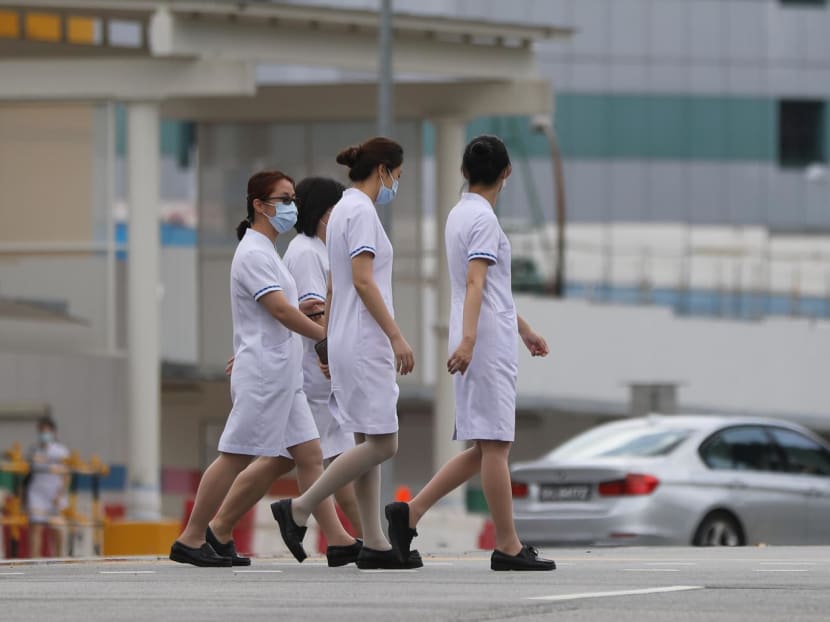Abuses happen 'almost every day' leaving long-lasting scars, say healthcare workers urging more steps to tackle problem
SINGAPORE — For patient service assistant Ms Nur, getting shouted at or being at the receiving end of vulgarities and demeaning remarks just goes with the territory of being a healthcare worker.

- For many healthcare workers, receiving verbal, physical and sexual abuse from patients and their next-of-kin is a common occurrence
- Some who spoke to TODAY said that the frequency has deterred them from reporting such cases as they are resigned to the fact that it continues to happen so often
- However, they believe that more can and should be done to prevent such behaviours
- One of their recommendations is to implement a policy that would allow healthcare institutions to refuse treatment of abusive patients
SINGAPORE — For patient service assistant Ms Nur, getting shouted at or being at the receiving end of vulgarities and demeaning remarks just goes with the territory of being a healthcare worker.
“It is really common, it occurs every day. I feel like receiving these abuses is just part of my job,” said Ms Nur, who declined to reveal her full name. She is in her 20s and works at a public hospital.
Once a patient shouted at her because she would not let him see the doctor who was tending to another patient.
“He demanded to go into the doctor’s room because he had waited for so long. I tried to get him to understand that the doctor was occupied but he wouldn’t listen and shouted at me. It was very scary,” she said.
Several other healthcare workers told TODAY that they, too, experienced abuse on an almost everyday basis and in different forms, whether physical, sexual or verbal.
These happen so often that they could not help but feel helpless and think that nothing can be done to reduce the occurrence.
Still, all of them welcome a tripartite workgroup’s findings about abuses against healthcare workers and its proposed efforts to prevent abuses in public, private and community sectors.
The tripartite workgroup, which comprised representatives from the Ministry of Health (MOH), the public healthcare clusters, community care partners, private healthcare providers and the Healthcare Services Employees’ Union, revealed their findings on Friday (March 17).
The workgroup also proposed some measures to be taken, not only to reduce the number of abuse cases but to also prevent them from happening in the first place.
Among the measures proposed were discharging abusive patients and refusing unreasonable requests when the patient does not require urgent care.
Healthcare workers TODAY spoke to said that more can be done on top of these recommendations, such as implementing a policy that allows them to refuse treatment of abusive patients, or having more closed circuit television (CCTV) cameras installed at their workplace.
For these workers, the mental and emotional scars from being abused remain long after the incidents occurred.
One of them, who declined to be named, recounted an incident in 2016 when a patient flashed his genitals at her.
“He was wearing a sarong (a cloth) and he uncovered it to show me his penis. Then, he asked me whether it was big or not, and asked if I wanted to touch it,” the senior registered community nurse said.
“I just took a towel and covered him. I said, 'if you don’t respect me, I will leave'. So I left and went to my community hospital and reported it to the office.”
Her community hospital then highlighted the case to the Agency for Integrated Care, who had referred them to the case, and withdrew care of the patient.
Just two months ago, Ms Devi Raman, a senior staff nurse at Tan Tock Seng Hospital, was punched by a patient.
The man who was in his 50s had asked for water and continued to demand it even after a nurse had gone to take some for him.
He then became increasingly impatient and proceeded to get out of his bed to take some for himself.
Ms Devi who happened to pass by his bed, saw the man getting up and approached him to support him from falling off the bed. Thinking that she was there to stop him, he punched her forcefully on her right wrist, causing her to recoil in shock.
“My wrist was in so much pain. I’ve sustained injuries before on my right hand so it’s very sensitive. When he punched me, I could feel the pain up to my shoulders, and my whole arm became very swollen,” she said.
Her colleagues who witnessed the incident immediately called for security.
Ms Devi was then offered counselling by the hospital but she declined, saying she did not need help.
Other healthcare workers said that there were times when they did not report incidents of abuse, citing reasons such as having become desensitised to the abuse and thinking that nothing can be done.
Ms Nur said that she usually does not report when patients hurl vulgarities or shout at her because they happen so often.
“I have just learned to let it go. I used to talk back but now that I’m older, I just keep my cool,” she said.
“Once, my colleague and I were walking past a man and he touched my friend’s buttocks. We were both shocked and quickly walked away from him.
“Then another patient approached us for help so we went and got distracted from what happened. We didn’t bring it up again after that or report it.”
MORE CAN BE DONE TO PROTECT HEALTHCARE WORKERS
While some do not have concrete suggestions to prevent abuses, all of the healthcare workers believe that more can and should be done.
Ms Nur believes that long waiting times are the catalyst for some of the abuse healthcare workers face, and she hopes that healthcare organisations take their employees’ feedback on workflow processes seriously.
“There is not much we (healthcare workers) can do. It is the organisation that is in charge of the workflow processes and can do something, like reducing the waiting times at the hospitals or clinics,” she said.
For Ms Devi, she welcomed the recommendations by the tripartite working group and believe they can help to reduce the number of abuse cases.
Dr Desmond Wai, a gastroenterologist and hepatologist in private practice, said that his staff, particularly those who are patient-facing, receive abuse quite regularly.
These include passing rude remarks lamenting his staff’s “slow service”, and an incident when a patient threw his credit card at his staff’s face when the latter said the clinic could not accept his payment mode.
To mitigate the problem of abuse, he suggested a policy to be implemented to allow private practices to refuse treatment of patients who have verbally abused staff.
“We need to have a consequence to the abusive action so that we can draw the line at such behaviour. Installing more CCTV cameras can also help to support staff with proof when abuse incidents occur,” Dr Wai said.
Sociologist Tan Ern Ser from the National University of Singapore said that some patients may also treat healthcare workers poorly because they think that the latter is not doing enough to help them.
“The patients may therefore see their abusive behaviour as an expression of 'righteous anger' against being unfairly treated,” he said.
Another sociologist, Professor Paulin Straughan from the Singapore Management University, said that while there are no justifications for abuse, the high pressure environment in healthcare settings may trigger abusive behaviours.
The uncertainty and worry patients have for themselves or their loved ones, coupled with other factors such as long waiting times, may be a trigger for people to express themselves in aggressive ways.
Thus, Prof Straughan recommends good healthcare infrastructure that can create a positive and calming ambience for patients and better notification systems to alert and update patients on their appointments.
Another pressure point could be the workload of the healthcare workers.
“If they have very heavy loads, they are not able to give the kind of attention to family members or patients who have to wait for so long. This could provide all the ripe ingredients for an unpleasant encounter,” Prof Straughan said.












